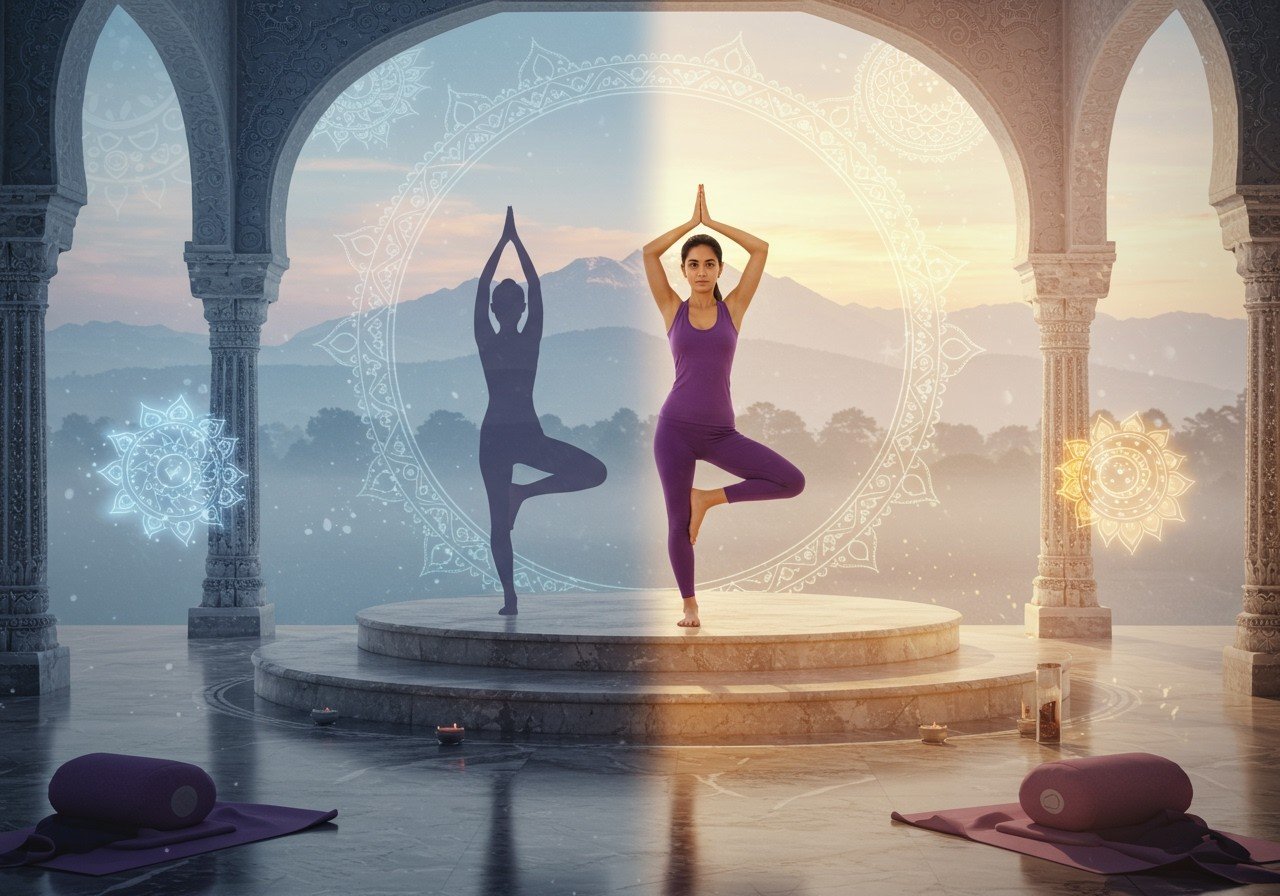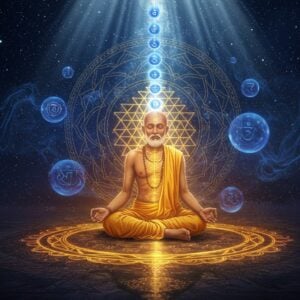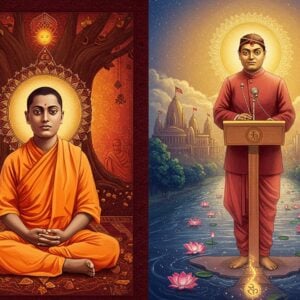Delving into Yoga Philosophy: Beyond the Asanas

Yoga, originating in ancient India, is far more than just a physical practice. It’s deeply rooted in the Astika philosophies, a group of philosophical schools that recognize the authority of the Vedas. Often misunderstood as solely physical exercise, yoga’s true essence lies in its philosophical underpinnings, aiming for spiritual liberation, also known as moksha.
Astika: The Core of Yoga’s Wisdom
Understanding Astika is crucial to grasping yoga philosophy. Astika encompasses six classical schools of thought, and yoga shares a close bond with Samkhya. While both emphasize liberation, their paths differ. Yoga champions practice and discipline, while Samkhya leans towards knowledge and understanding. This connection provides context for yoga’s position within the larger Indian philosophical system.
Yoga: A Holistic Blend of Theory and Practice
Yoga is not merely bending and stretching; it’s a rich tapestry woven with both theoretical and practical threads. To truly comprehend yoga, we must explore both these dimensions.
The Theoretical Side of Yoga
Yoga delves into profound questions about the self, consciousness, and the universe. Who are we beyond our physical bodies? How do we connect with the world? These inquiries lie at the heart of yoga’s wisdom, guiding us towards understanding our purpose in life.
The Practical Application of Yoga
The practical side brings this wisdom to life through actions. Meditation stills the mind, pranayama (breathing techniques) balances energy, and asanas (postures) prepare the body for deeper spiritual exploration. Together, these practices harmonize mind, body, and spirit.
Theory without practice remains abstract; practice without theory lacks depth. The synergy of both leads to a balanced and enlightened existence.
Dispelling Common Myths about Yoga
Several misconceptions cloud the true meaning of yoga. Let’s clarify some of these:
- Myth: Yoga is just physical exercise. Yoga is a holistic practice encompassing breathwork, mindfulness, and self-awareness, fostering inner peace and resilience. It’s about connecting with your inner self, not just achieving physical fitness. Explore more about holistic well-being with Yoga and Ayurveda.
- Myth: Yoga is a religion. Yoga is a spiritual discipline welcoming all faiths. Its focus is personal growth, not religious dogma. It encourages self-discovery and connection to your true essence, regardless of background. Discover items to support your spiritual journey at poojn.in.
- Myth: Yoga requires flexibility. Yoga is adaptable to individual needs and abilities. Using props ensures everyone can benefit, regardless of physical limitations. Props can further deepen and extend poses, regardless of flexibility. Browse our store for props to enhance your practice.
- Myth: Yoga is only for physical fitness. While yoga improves physical health, its ultimate aim is spiritual enlightenment, a journey of self-discovery and connection to one’s true self. It’s about inner transformation, not just external fitness. Find brands that align with your spiritual journey.
Yoga’s Place in the Indian Philosophical Landscape
Yoga resides within the Vedic tradition, alongside philosophies like Vedanta, Buddhism, and Jainism. Each system offers unique perspectives, often influencing one another.
- Vedanta and Yoga: Vedanta stresses the unity of the individual soul (Atman) with the universal spirit (Brahman). Yoga provides practices to experience this oneness directly, complementing Vedanta’s teachings. The integration of Vedanta’s principles with yoga practices creates a powerful pathway for self-realization.
- Buddhism and Jainism: Buddhism’s mindfulness and compassion resonate with yoga’s ethical precepts (Yamas and Niyamas). Similarly, Jainism’s emphasis on non-violence aligns with yoga’s principle of Ahimsa. These intersections highlight the interconnectedness of various Indian philosophies and their shared values.
Yoga has evolved over time, drawing inspiration from various traditions while retaining its unique identity.
Living Yoga Philosophy Every Day
Yoga philosophy transcends the mat, guiding our daily lives and promoting overall well-being.
- Ethical Guidelines (Yamas and Niyamas): These principles encourage truthfulness, contentment, and self-discipline, fostering harmony in relationships and inner peace. By integrating the Yamas and Niyamas into our daily interactions, we can create a more balanced and meaningful life. Learn more about the harmonious connection between yoga and spirituality.
- Meditation and Mindfulness: These practices enhance mental clarity and emotional stability, fostering presence and reducing stress. By cultivating mindfulness, we can fully experience the present moment and appreciate the richness of life. Explore meditation techniques for beginners and discover inner calm.
- A Balanced Lifestyle: Yoga promotes a holistic lifestyle, integrating physical, mental, and spiritual health. It encourages a harmonious balance between activity and rest, leading to a fulfilling and purposeful life. Incorporating yogic principles into your daily routine can improve overall well-being.
Embracing yoga philosophy equips us to navigate life’s complexities with grace and wisdom.
Poojn.in: Supporting Your Yogic Journey
Poojn.in offers a curated selection of products to enhance your yoga and meditation practice. We provide Ganesha idols, incense holders, yoga mats, meditation cushions, incense sticks, bells, and singing bowls to create a sacred space for your practice. Explore our Adiyogi statue, Lord Shiva Murti, or Standing Shiva Murti for your meditation altar. Browse our clay items and Dashakarma items. Our products are thoughtfully chosen to support your physical practice and spiritual development. Visit poojn.in for your ritual and meditation supplies.
Embracing the True Essence of Yoga
Yoga philosophy offers timeless guidance for modern living. It beautifully integrates the theoretical wisdom of the self and the universe with practical applications like meditation and ethical living. By debunking misconceptions, we can grasp yoga’s true essence – a pathway of spiritual growth open to all. Embrace this holistic approach and unlock a life of balance, peace, and enlightenment.
Addressing Common Misunderstandings About Yoga
Many myths surround yoga. Let’s clarify a few:
- Flexibility is a prerequisite for yoga. This is untrue. Yoga enhances flexibility; you don’t need to be flexible to begin. Yoga postures adapt to different levels of flexibility and can improve strength and stamina over time.
- Yoga is exclusively for women. Yoga is for everyone, regardless of gender. Historically, men predominantly practiced yoga. Modern yoga welcomes practitioners of all genders and backgrounds.
- Yoga is not a “real” workout. Yoga can be a vigorous workout that builds strength and endurance. Styles like Power Yoga provide a challenging physical practice. Various yoga styles cater to different fitness levels.
- Yoga is merely stretching. Yoga is much more than stretching. It integrates mind, body, and spirit for holistic well-being. It connects breath with movement, fostering a deeper mind-body connection.
- Yoga is confined to the mat. Yoga’s principles extend beyond the mat, influencing daily life. Yoga encourages mindfulness, balance, and conscious breathing in all aspects of life.
- Yoga is too easy. While some yoga practices are gentle, they can still challenge the mind, breath, and patience. Yoga’s focus on mental discipline can be demanding regardless of physical intensity.
- Yoga is only for thin people. Yoga is for all body types. Poses can be modified using props to accommodate individual needs. Yoga promotes body positivity and self-acceptance.
- Yoga is only for young people. Yoga benefits people of all ages. Modifications can be made for older adults with varying physical conditions. Yoga’s gentle movements can be beneficial for joint health.
- Yoga exacerbates arthritis due to twisting and bending. Many yoga styles use gentle movements and props, making them safe for people with arthritis. Yoga can improve joint mobility and reduce pain.
- Yoga is too gentle to provide physical benefits. Yoga offers both physical and psychological benefits, improving strength, flexibility, mood, and stress management. It’s a holistic practice beneficial for overall well-being.
- Yoga requires special clothing. Comfortable clothing is all you need for yoga. Specialized attire is not necessary for effective practice.
- Yoga involves awkward and painful positions. Yoga is not about forcing the body into painful positions. It emphasizes mindful movement and respecting your body’s limits.
- Yoga is solely about physical exercise. Yoga involves observing and controlling breath, body, and mind during practice. It integrates mental and physical aspects for a holistic experience.
- Yoga proficiency is measured by complex poses. Yoga is not about achieving complex poses. It’s about aligning mind, body, and breath to support daily life. The focus is on internal growth, not external performance.
- Yoga automatically leads to happiness. Yoga can enhance mood and reduce stress, but sustained benefits require dedication and effort. It’s a practice that unfolds over time.
- Using props signifies inadequacy in yoga. Props support and deepen yoga practice. Using props demonstrates awareness of your body’s needs.
- There’s a “good” or “bad” in yoga. Yoga is a personal journey, not a competition. There are no judgments in yoga; it’s about self-discovery.
- Yoga requires a vegan lifestyle. Dietary choices are personal. Yoga philosophy does not mandate a specific diet.
- Yoga mandates spirituality. Yoga, as practiced in most classes, is not a religion. It can complement any spiritual or religious beliefs.
- Props are discouraged in yoga. Props are valuable tools for all practitioners, regardless of experience. They enhance accessibility and deepen the practice.


